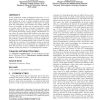Free Online Productivity Tools
i2Speak
i2Symbol
i2OCR
iTex2Img
iWeb2Print
iWeb2Shot
i2Type
iPdf2Split
iPdf2Merge
i2Bopomofo
i2Arabic
i2Style
i2Image
i2PDF
iLatex2Rtf
Sci2ools
108
click to vote
SIGECOM
2010
ACM
2010
ACM
Equilibria of plurality voting with abstentions
In the traditional voting manipulation literature, it is assumed that a group of manipulators jointly misrepresent their preferences to get a certain candidate elected, while the remaining voters are truthful. In this paper, we depart from this assumption, and consider the setting where all voters are strategic. In this case, the election can be viewed as a game, and the election outcomes correspond to Nash equilibria of this game. We use this framework to analyze two variants of Plurality voting, namely, simultaneous voting, where all voters submit their ballots at the same time, and sequential voting, where the voters express their preferences one by one. For simultaneous voting, we characterize the preference profiles that admit a pure Nash equilibrium, but show that it is computationally hard to check if a given profile fits our criterion. For sequential voting, we provide a complete analysis of the setting with two candidates, and show that for three or more candidates the equili...
ECommerce | Sequential Voting | SIGECOM 2010 | Simultaneous Voting | Voting Manipulation Literature |
| Added | 06 Dec 2010 |
| Updated | 06 Dec 2010 |
| Type | Conference |
| Year | 2010 |
| Where | SIGECOM |
| Authors | Yvo Desmedt, Edith Elkind |
Comments (0)

